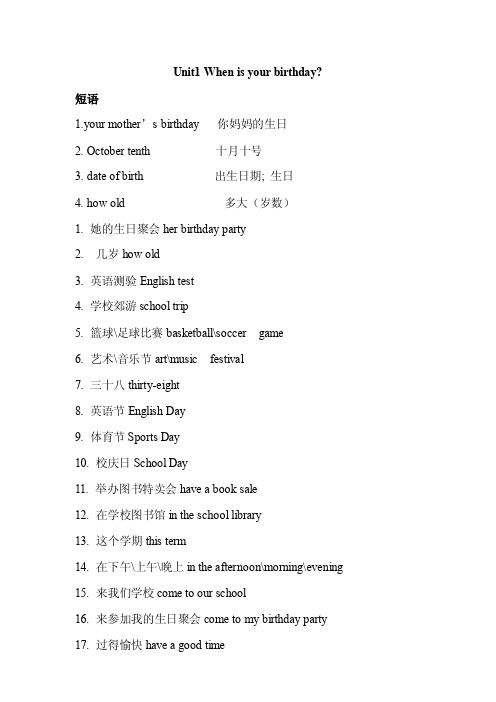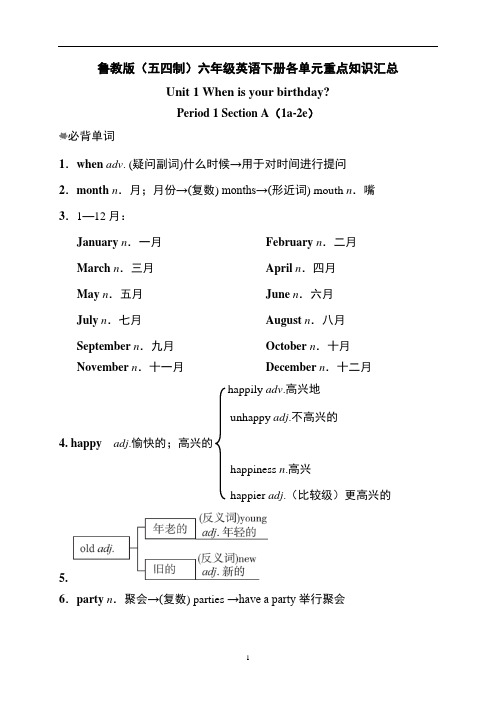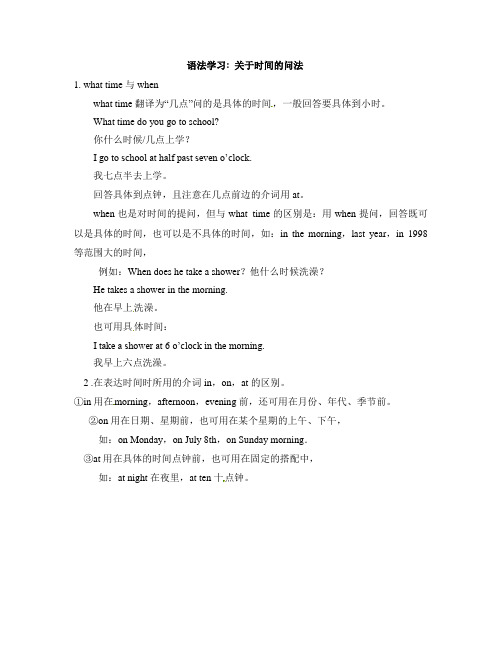鲁教版英语(五四制)六年级下册_Unit4_单元要点梳理总结
鲁教版英语六下Unit4复习提纲

Unit4______________________________________________SectionA一.用词组尽可能多地写出一个人一天可能的活动:___________________________________________ __________________________________________________________________________________________ __________________________________________________________________________________________ 二.两人一组,讨论你一天的活动。
A:____________________________________________B:__________________________________________ __________________________________________________________________________________________ __________________________________________________________________________________________ __________________________________________________________________________________________ __________________________________________________________________________________________ __________________________________________________________________________________________ 两人一组,讨论一下Tom一天的活动:__________________________________________________________________________________________ __________________________________________________________________________________________ __________________________________________________________________________________________ __________________________________________________________________________________________ __________________________________________________________________________________________ __________________________________________________________________________________________ 三.翻译:起床______________去上学_______________穿衣服___________________刷牙____________ 吃早饭_________________洗淋浴_______________________兄弟姐妹______________________________ Jim的家________________在5:50___________________一个有趣的工作____________________________ 在广播电台__________________________从夜里12点到早上6点__________________________________ 一个有趣的时间________________________去上班_______________我上班从不迟到。
鲁教版初中英语六年级下第4单元重点句型及精讲

M6II Unit 4 What time do you go toschool?1.Scott has an interesting job. He works at a radio station.At a radio stationTrain station 火车站Station = stopBus stop 公交站2.What time do they get dressed? They always get dressed at seven o’clock.Get dressed 穿衣服get/ be done 被动Dress sb in sth 给某人穿衣Does he dress his little brother?At + 时间点3.When do your friends exercise? They usually exercise on weekends.On the weekendOn weekends 每逢;每到On rainy nights 每到雨夜Exercise 健身Work out 健身vi;解决vt.When do your friends work out?现阶段经常性或习惯性的动词。
The earth moves around the sun.4.What time do you usually brush teeth? Brush teeth 刷牙ToothToothbrush 牙刷RaincoatWallpaperWindfall 风吹落的东西;意外的收获Bottleneck 瓶颈Overthrow 推翻Hot potato 烫手山芋Toothache 牙疼EaracheHeadache5.I usually take a shower at six forty. Take a shower 淋浴6.I never get up so early.副词修饰动词,做状语。
鲁教版五四制英语六年级下册Unit4 【语法透视】:what time和 when引导的特殊疑问句

【语法透视】:what time和when引导的特殊疑问句【教材典句】1. —What time do you usually take a shower, Rick? 里克,你通常几点洗淋浴?—I usually take a shower at six forty. 我通常六点四十洗淋浴。
2. —What time does Rick eat breakfast? 里克几点吃早饭?—He eats breakfast at seven o’clock. 他七点吃早饭。
3. —When do your friends exercise? 你的朋友们几点时候锻炼?—They usually exercise on weekends. 他们通常在周末锻炼。
以上几句是what time和when引导的询问时间的特殊疑问句及其答语。
【语法全解】what time意为“何时,什么时候”。
如果询问主语什么时候做某事,可以用“What time do/does+主语+动词原形+…”句型,其中,what time用来提问具体的钟点,此时的what time可以用when替换。
What time do you get up? (=When do you get up?)你什么时候起床?What time does she often watch TV? (=When does she often watch TV?)她经常什么时候看电视?辨析:what time 与when【拓展】用what time提问时间,答语应包括具体的时间点;用when提问时间,答语则不一定为具体的时间点;用when提问时间,回答若是具体的时间点,则可以用what time替换。
中考链接:(2012·广东佛山)—____ do you go to school?—At 7:00 in the morning.A. WhatB. HowC. What timeD. How old【答案】:C【解析】:what“什么”;how“怎样”;what time“什么时间”;how old“多大”。
鲁教版英语六年级下unit4知识点

鲁教版英语六年级下unit4知识点Unit4 What time do you go to school?⼀、短语1.起床这么早get up early 早睡go to bed early 上班go to work周末起床很晚get up late on weekends 上床睡觉go to bed2.穿上⾐服get dressed 在周末on the weekend (on weekends)3.刷⽛brush teeth 淋浴,洗澡take/have a shower4.在上班at work 在学校at school 在晚上at night 上学的⽇⼦on school days5.在⼴播电台上班work at a radio station 有⼀份有趣的⼯作have an interesting job6.你的⼴播节⽬在⼏点? What time is your radio show?7.做家庭作业do (one’s) homew ork 散步take a walk (go for a walk)8.到达get to 回家go home 去那⾥go there9.要么…要么…(两者中的⼀个)either….or….10.⼤量,许多的a lot of = lots of11.吃早饭,午饭,晚饭eat breakfast\lunch\dinner 吃顿好早饭eat a good breakfast12.吃得快eat quickly 吃⽔果和蔬菜eat fruit and vegetables 吃冰激凌eat ice-cream13.玩电⼦游戏play computer games 看电视watch TV 做运动play sports14.差⼀刻12点(11点45)a quarter to twelve = eleven forty-five9点过5分(9:05)five past nine=nine five现在是⼗点,It’s ten (o’clock). 6点半half past six15.从周⼀到周五from Monday to Friday 打扫我的房间clean my room16.拥有很健康的⽣活have a very healthy life 健康的活动healthy activities健康的习惯healthy habits⼆、句⼦1.安娜上班从不迟到。
鲁教版(五四制)6年级下册重点短语(unit1-unit4)

Unit1 When is your birthday?短语1.your mother’s birthday 你妈妈的生日2. October tenth 十月十号3. date of birth 出生日期; 生日4. how old 多大(岁数)1. 她的生日聚会her birthday party2. 几岁how old3. 英语测验English test4. 学校郊游school trip5. 篮球\足球比赛basketball\soccer game6. 艺术\音乐节art\music festival7. 三十八thirty-eight8. 英语节English Day9. 体育节Sports Day10. 校庆日School Day11. 举办图书特卖会have a book sale12. 在学校图书馆in the school library13. 这个学期this term14. 在下午\上午\晚上in the afternoon\morning\evening15. 来我们学校come to our school16. 来参加我的生日聚会come to my birthday party17. 过得愉快have a good time18. 我妹妹的生日my sister’s birthday19. 生日快乐happy birthday20. 再见good-bye句子1.你妈妈什么时候过生日?When is your mother’s birthday?2.你父亲多少岁?50.How old are your father?He is fifty.3. 你的生日是什么时候?我的生日是六月四号。
When is your birthday? My birthday is June fourth.4. DA TE OF BIRTH: March 21st. 出生日期:三月二十一日。
鲁教版(五四制)六年级英语下册各单元重点知识汇总

鲁教版(五四制)六年级英语下册各单元重点知识汇总Unit 1 When is your birthday?Period 1 Section A(1a-2e)必背单词1.when adv. (疑问副词)什么时候→用于对时间进行提问2.month n.月;月份→(复数) months→(形近词) mouth n.嘴3.1—12月:January n.一月February n.二月March n.三月April n.四月May n.五月June n.六月July n.七月August n.八月September n.九月October n.十月November n.十一月December n.十二月happily adv.高兴地unhappy adj.不高兴的4.happy adj.愉快的;高兴的happiness n.高兴happier adj.(比较级)更高兴的5.6.party n.聚会→(复数) parties →have a party举行聚会必背短语7.Alice's birthday艾丽斯的生日8.your father's birthday 你父亲的生日9.in August 在八月10.at three this afternoon今天下午三点钟必背句子11.—When is your birthday,Mike?迈克,你的生日是什么时候?—My birthday is on June 3rd.我的生日是在六月三日。
12.Happy birthday! 生日快乐!13.—How old are you? 你多大了?—I'm thirteen. 我十三岁了。
14. Well,do you want to come to my birthday party?哦,你想来参加我的生日聚会吗?15.—When is it? 聚会是在什么时候?—At three this afternoon. 今天下午三点钟。
鲁教版六年级下英语第四单元知识点

Unit 4 What time do you go to school? 一,new words and sentences起床,站起dress v n通常地,一般地一刻钟,四分之一从不,绝不生活,生命很快地或者,也有时,间或tasteAbout有趣的吃早餐的时间(1)我没有太多时间吃早餐,因此我吃的很快。
(2)放学后,有时我会打半个小时的篮球。
(3)当我回到家的时候,我总是首先做我的家庭作业。
(4)在晚上,我要么看电视,要么打电脑游戏。
(5)在十二点,她午餐吃很多水果和蔬菜。
(6)她知道它对她的健康不好,但是它尝起来很棒!二,key words1,get dressed穿衣服,表示穿的动作It’s time for work.Please .Be dressed in穿着,表示穿的状态She is dressed in . dress sb./oneself给某人、自己穿衣服他不会给自己穿衣服。
.2,tooth复数刷牙It’s a good habit to brush our .3,shower洗淋浴与take有关的词组:休息散步参加照顾上课锻炼4,你通常几点起床?What time...?Time (1)不可数名词,“时间”,没有复数形式,但是在固定搭配中前面可以用不定冠词a。
玩的开心 a long time(2)可数名词,“次数,倍数”,复数形式为Three times5,at,in and onNight/noon/half past tenMay/summer/winter/the morning/2016May 1st/Monday/Children’s Day/the afternoon of July 5th/Tuesday evening6,never,always,usually and sometimes7,earlyadj 早的早班公共汽车Adv 早他早晨起床早。
8,I want to findin Beijing. 工作,可数名词My fatherin a hospital.vi,工作He is never late for.工作,不可数名词9,。
鲁教版五四制英语六年级下册Unit4 语法学习:关于时间的问法

语法学习: 关于时间的问法
1. what time与when
what time翻译为“几点”问的是具体的时间,一般回答要具体到小时。
What time do you go to school?
你什么时候/几点上学?
I go to school at half past seven o’clock.
我七点半去上学。
回答具体到点钟,且注意在几点前边的介词用at。
when也是对时间的提问,但与what time的区别是:用when提问,回答既可以是具体的时间,也可以是不具体的时间,如:in the morning,last year,in 1998等范围大的时间,
例如:When does he take a shower?他什么时候洗澡?
He takes a shower in the morning.
他在早上洗澡。
也可用具体时间:
I take a shower at 6 o’clock in the morning.
我早上六点洗澡。
2 .在表达时间时所用的介词in,on,at的区别。
①in用在morning,afternoon,evening前,还可用在月份、年代、季节前。
②on用在日期、星期前,也可用在某个星期的上午、下午,
如:on Monday,on July 8th,on Sunday morning.
③at用在具体的时间点钟前,也可用在固定的搭配中,
如:at night在夜里,at ten十点钟。
- 1、下载文档前请自行甄别文档内容的完整性,平台不提供额外的编辑、内容补充、找答案等附加服务。
- 2、"仅部分预览"的文档,不可在线预览部分如存在完整性等问题,可反馈申请退款(可完整预览的文档不适用该条件!)。
- 3、如文档侵犯您的权益,请联系客服反馈,我们会尽快为您处理(人工客服工作时间:9:00-18:30)。
Unit4 单元要点梳理总结重点短语1.去上学go to school2.起床get up3.穿衣服get dressed4.刷牙brush teeth5.吃早饭eat breakfast6.洗澡take a shower7.什么时间what time 8.在六点四十at six forty9.一份有趣的工作an interesting job 10.在广播电台at the radio station 11.从……到……from … to …12.在夜晚at night13.做运动、锻炼take exercise/play14.迟到……be late forsports15.在周末on weekends 16.在上学日on school days17.六点半(逆读)half past six 18.三点十五(逆读) a quarter past threea quarter to ten 20.散步take a walk19.九点四十五(逆读)21.去睡觉go to bed 22.吃得快eat quickly23.半个小时half an hour 24.或者……或者……either…..or25.许多lots of = a lot of 26.对……有益be good for…27.尝起来好taste good 28.有健康的生活方式have a healthy life重点句型1.你几点去上学?What time do you go to school?What time do you usually take a shower,Rick?2. 瑞克,你通常几点钟淋浴?3. 我通常六点四十淋浴。
I usually take a shower at six forty.4. 你什么时候去上班?When do you go to work?At eleven o’clock, so I’m never late for work.5. 十一点,我上班从来没有迟到过6. 他们几点钟穿上衣服?What time do they get dressed?They always get dressed at seven twenty.7. 他们总是七点二十穿上衣服。
What time does your best friend go to school?8. 你最好的朋友几点去上学?When do students usually eat dinner?9. 学生们通常几点钟吃晚餐?They usually eat dinner at a quarter to seven in the evening.10. 他们通常晚上六点四十五吃正餐。
When I get home. I always do my homework first.11. 我到家后,总是先做家庭作业。
In the evening, I either watch TV or play computer games.12. 晚上,我要么看看电视,要么玩玩电脑游戏。
1.牙齿n. _____→ _____(复数)2.一半n. ____→ ______(复数)3.生命;生活n. ___→ ____(复数)1.get dressedget dressed意为“穿上衣服”,dress用作动词,表示“给(某人)穿衣服”,接宾语时,只能接表示人的名词或者代词。
He can’t dress himself.I usually dress my daughter before I go to work.【拓展】辨析wear, put on和dresswear 穿着侧重于穿戴的状态The girl wears a red coat today. put on 穿上侧重于穿戴的动作Put on your coat. It is cold outside.2.take a showertake a shower意为“洗淋浴”,相当于have a shower,shower用作名词,表示“淋浴”。
I often take a shower in the evening.I take a cold shower when I feel tired.3.What time do you usually get up, Rick?(1)what time用来询问具体的时间点,表示“什么时候”。
What time do you go to school?(2)usually是频度副词,意为“通常、一般”,在句中作状语,一般位于实义动词之前,连系动词be、助动词或者情态动词之后。
I usually have lunch at school.He usually goes to school by bike.4.I never get up so early.early此处用作副词,表示“很早地”,反义词为late,意为“晚地”。
Please come to school early tomorrow.【拓展】early还可以用作形容词,表示“早的、提前的”,反义词是late,意为“晚的”。
He gets up early to catch the early bus.5.Scott has an interesting job.job用作可数名词,表示“工作”,强调具体的职业或者工作,work表示“工作”时,用作不可数名词,指人们日常生活和工作中从事的体力或者脑力劳动,及各类工作。
Mary has a good job in the bank.He has a lot of work to do every day.6.From twelve o’clock at night to six o’clock in the morning.from...to...意为“从……到……”。
How far is it from your office to the bank?We work from morning to night.7.At eleven o’clock, so I’m never late for work.be late for意为“迟到”,相当于come late to。
I’ll be late for the meeting.Please don’t be late for school.8.In our group, Li Fei usually gets up late on weekends.group用作名词,表示“组、群”,a group of意为“一组……,一群……”,后接可数名词复数。
My group has some good players.A group of girls are cleaning the room.11. go homego home意为“回家”,此处home用作副词,表示地点,前面不用介词,类似的词还有here,there。
go there 去那;come here 来这;get home 回家。
12.take a walktake a walk意为“散步”相当于have a walk/go for a walk。
Let’s take a walk.13. After school, I sometimes play basketball for half an hour.sometimes 副词,意为“有时”,相当于at times。
He sometimes goes to school on foot.【辨析】:sometimes, some times, sometime与some timeShe comes to visit us sometimes.她有时来看望我们。
Lucy has been to Beijing some times.露西去过北京几次了。
Jack will leave for America sometime next week. 杰克将在下周某个时候动身去美国。
I need some time to do my homework. 我需要一些时间来做作业。
14. In the evening, I either watch TV or play computer games.either...or...意为“要么……要么……;或者……或者……”,用来连接两个单词或者短语。
When the girl is happy, she either sings or dances.He is either in the classroom or in the library.15. At twelve, she eats lots of fruit and vegetables for lunch.lots of意为“许多的、大量的”,既可以修饰可数名词复数也可以修饰不可数名词,相当于a lot of。
There is lots of/a lot of milk in the glass.16. She knows it’s not good for her, but it tastes good.(1) be good for意为“对……有益,对……有好处”,反义短语为be bad for,意为“对……有害”。
Eating more vegetables is good for you.It’s bad for your eyes to read in the sun.(2)taste此处用作系动词,表示“尝起来,有……味道”。
This tomato tastes sweet.This drink tastes like orange juice.【拓展】类似的表示感觉的系动词还有:look看起来、sound听起来、smell闻起来、feel 感觉起来。
17. Here are your clothes.此句是here引导的倒装句,当副词here,there等位于句首时,且主语为名词时,句子要完全倒装。
Here comes the bus.Here is a letter for you.频度副词英语中常见的频度副词有usually, sometimes, always, often, seldom, never等,它们用来表示动作发生的频率,但是在程度上有所区别,频率由高到低依次是:always>usually>often>sometimes>seldom>never。
频度副词放在be动词、情态动词和助动词之后,实义动词之前,对频率的提问用how often。
